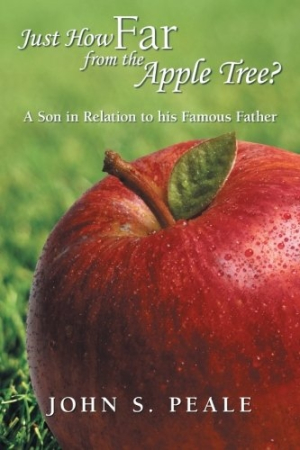Just How Far from the Apple Tree?
A Son in Relation to His Famous Father
Distinguished professor John S. Peale is the son of the late Norman Vincent Peale, whom many consider one of the most influential clergymen of the twentieth century. The elder Peale was an esteemed minister and a best-selling author whose opinions and teachings were deemed of immense value by some and challenged as extremely controversial by others. The popularity of his teachings has diminished over the years, but his son continues to deal with life as the less-renowned offspring of his famous father.
John S. Peale, author of two prior books of nonfiction, has published a memoir, appropriately entitled Just How Far from the Apple Tree? A Son in Relation to His Famous Father. Despite having achieved much success of his own, the younger Peale does not seem to have overcome the issues he faced as the child of an extraordinarily successful father and a mother who spent her life in support of her husband and his work. Peale’s story is not a particularly happy one. While he attests to having found peace with himself and the challenges of living in his father’s shadow, his book does not really support this claim. He writes from the heart, with much pain at times, hoping to inspire others dealing with similar circumstances. He attempts to show that it is indeed possible to step out of the shadow of highly successful parents and “into the Sunlight of the Spirit,” as he believes he has done. Often, however, his words seem to indicate that he is not yet there. Peale does not seem to have come to terms completely with the words, incidents, and parental disregard that he believes led him into the “web of confusion and anger” that overtook much of his life.
In childhood, as part of a close, loving family, young John was happy; in his teens, when his father becomes famous and no longer available to his children, John eventually fell “down into the depths of despair.” As an example of a simple cause-and-effect relationship, his father’s fame seems to be at the heart of the problem, but there’s more to it. His father’s hurtful and dismissive words had troubling effects on the author, yet the young Peale sought his father’s approval at any cost. Even after finding success in academia, not his father’s strong suit, he continues to seek his parents’ approval. In 1955, he was “trying to impress [his parents]…always wanting them to notice me and think well of me.” Almost sixty years later, he is still trying “to give them a present of my understanding and support.” It comes across as a losing battle.
John Peale claims great love and regard for his father, but he’s not above casting his parents in a lesser light when his account calls for it. As Just How Far from the Apple Tree? shows, much of his life has been profoundly difficult. He is certainly entitled to voice his thoughts and opinions, and he does so in a clear, well-written fashion. How helpful his story will be to others trying to fight their way out of a parent’s shadow, however, is not as clear.
Reviewed by
Cheryl Hibbard
Disclosure: This article is not an endorsement, but a review. The publisher of this book provided free copies of the book and paid a small fee to have their book reviewed by a professional reviewer. Foreword Reviews and Clarion Reviews make no guarantee that the publisher will receive a positive review. Foreword Magazine, Inc. is disclosing this in accordance with the Federal Trade Commission’s 16 CFR, Part 255.

